- europages
- >
- COMPANIES - SUPPLIERS - SERVICE PROVIDERS
- >
- copper nickel alloys
Results for
Copper nickel alloys - Import export
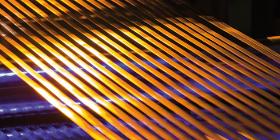
AMETEK SPECIALTY METAL PRODUCTS
United States
Shunt Manganin is a Copper-Manganese resistance alloy used for shunts in various high current applications. The alloy has a low temperature coefficient of resistivity with peak resistance at about 50°C. The thermal EMF vs. Copper is very low. The alloy can be easily formed from the annealed temper.The maximum recommended operating temperature in air is 200°F. Available Sizes: Shunt Manganin is available from Hamilton Precision Metals as strip product in thicknesses from 0.0005 to 0.053” (0.0127 mm to 1.346 mm) in widths up to 12.0” (304.8 mm). It is also available in foil as thin as 0.000100” (0.00254 mm) in widths of 4.0” (101.6 mm) maximum.
Request for a quote
AMETEK SPECIALTY METAL PRODUCTS
United States
Cu-Ni 715 is a copper-nickel alloy that is resistant to corrosion in sea water. The alloy has good fatigue strength and relatively high thermal conductivity. This alloy is used mainly for flexible metal foil heaters. The alloy is readily formed in the annealed temper, and can be joined by the standard welding, brazing and soldering processes. Available Sizes: Cu-Ni 715 is available from Hamilton Precision Metals as strip product in thicknesses from 0.0005” to 0.010” (0.0127 mm to 0.254 mm) in widths up to 12” (304.8 mm). The material conforms to ASTM B122 and UNS C71500.
Request for a quote
AMETEK SPECIALTY METAL PRODUCTS
United States
Constantan® is a copper-nickel alloy that contains specific minor amounts of additional elements to achieve precise values for the temperature coefficient of resistivity. Careful control of melting and conversion practices results in a very low level of pinholes at ultra-thin thicknesses. The alloy is used extensively for foil resistors and strain gauges. The TCR can be adjusted from the furnished cold rolled values by using a low temperature heat treatment to achieve compensation for all types of spring elements. The foil is normally supplied with 90% cold reduction and a smooth bright surface. The foil is reasonably flat at 4” wide and nearly free of pinholes. The cold rolled foil can be produced with a TCR between +10 to –35 PPM/°C. The heat treatment will shift the foil TCR to the desired value. A typical heat-treat curve for Constantan® shows decreasing resistivity but increasing TCR with increased heat-treating temperature.
Request for a quote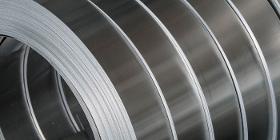
AMETEK SPECIALTY METAL PRODUCTS
United States
HPM® 400 is a Nickel-Copper alloy with excellent corrosion resistant characteristics in marine environments. The alloy is readily formed from the annealed temper. It is easy to fabricate by conventional welding techniques. Available Sizes: HPM® 400 is available from Hamilton Precision Metals as strip product in thicknesses from 0.0005” to 0.050” (0.0127 mm to 1.27 mm) and widths up to 12.0” (304.8 mm). The material conforms to ASTM B127 and UNS N04400.
Request for a quote
AMETEK SPECIALTY METAL PRODUCTS
United States
Hamilton Precision Metals is the world leader of precision-rolled foil and ultra-light gauge strip in any alloy. This includes stainless steel foil, titanium foil, nickel foil, copper based foil, cobalt based foil, Constantan® foil, Evanohm® foil, and many other alloys. Metal foil is generally defined as strip 0.004” (0.1016 mm) and below. Cold rolling strip to these extremely thin gauges demands extensive rolling expertise to manufacture with precision and consistency. Foil in Any Alloy We offer the broadest portfolio of almost every high performance alloy made today. Additional alloys are available upon request, contact us today! Stainless Steels Nickel Based Alloys Copper Based Alloys Cobalt Based Alloys Commercially Pure Titaniums Strain Gage: Constantan®, Evanohm®, Tightest Tolerances and Thinnest Gauges in the Industry We custom roll metal foil in nearly any alloy and specialty metal to the tightest tolerances and thinnest gauges
Request for a quote
AMETEK SPECIALTY METAL PRODUCTS
United States
Our highly specialized Spinodal materials are custom-engineered for electronic connectors and deliver major advantages in comparison to traditional materials such as Beryllium Copper (BeCu). We offer precision strip and wire products in alloy Pfinodal® (UNS C72900), a copper nickel tin Spinodal alloy, for the manufacturing of high performance electronic connectors in the electronics industry. Safe Alternative to Beryllium Copper (BeCu) Beryllium Copper (BeCu) materials are the historical choice for electronic connectors. Our high performance Pfinodal® (UNS C72900) delivers similar mechanical properties to Beryllium Copper but without the harmful exposure risks.
Request for a quote
AMETEK SPECIALTY METAL PRODUCTS
United States
Our Spinodal strip materials in Copper-Nickel-Tin alloys offer high ductility for forming into shaped charge liner material for the perforation of oil and gas well liners. Shaped Charge Liner Material Advantages The Spinodal material is produced through our wrought powder compaction process which imparts properties allowing the material to virtually ‘disappear’ upon activating the charge. The material is well suited to “big hole” applications for perforating charges and leaves little residue (commonly referred to as ‘carrots’ or ‘slugs’). Pfinodal® (C72900) and AM-388™ (UNS C72650) We produce two spinodal alloys for these shaped charge applications - Pfinodal® (C72900) copper alloy and AM-388™ (UNS C72650). They benefit from age hardening techniques that further increase their strength and hardness required for deep hole penetration applications. These spinodal materials deliver superior mechanical and physical properties in comparison
Request for a quote
AMETEK SPECIALTY METAL PRODUCTS
United States
Alloy 400 (UNS N04400) is a solid-solution Nickel/Copper alloy that can be hardened only by cold working. It has reasonable strength and toughness over a wide temperature range and excellent resistance to many corrosive environments. Alloy 400 is widely used in many fields, especially marine and chemical processing. Typical applications are valves and pumps; pump and propeller shafts; marine fixtures and fasteners; electrical and electronic components; springs; chemical processing equipment; gasoline and fresh water tanks; crude petroleum stills, process vessels and piping; boiler feedwater heaters and other heat exchangers; and deaerating heaters. Please note that we have a minimum order value of £10,000.
Request for a quote
AMETEK SPECIALTY METAL PRODUCTS
United States
Our specialized Pfinodal® C72900 material is a Spinodal copper based alloy with nickel and tin additions. It competes with Beryllium Copper alloy C17200 for electrical connectors and bearing materials where high strength and excellent formability without dimensional instability are required.
Request for a quote
AMETEK SPECIALTY METAL PRODUCTS
United States
Modern aircraft require dependable, high quality wire connection systems that play a crucial role in flight control performance to ensure safe transport of passengers and goods. Our high tolerance shaped wire is engineered for the production of push-pull mechanisms and custom cable assemblies used to deliver remote activation of aerospace controls. The shaped wire is used by manufacturers of these devices to build a bearing controlled linkage for applications requiring high tension and compression forces and tight radii for the wire cable assembly. Products We deliver custom wire shapes, custom alloys and precise sizes tailored to your specific push-pull control cable aircraft application. Alloys: Aluminum, carbon steel, copper, nickel alloy, nickel iron, resistance alloy, stainless steel, and other alloys such as nickel, iron and cobalt. Sizes: Super fine wire engineered from 0.004" (0.1016 mm) up to 0.250" (6.35 mm).
Request for a quote
AMETEK SPECIALTY METAL PRODUCTS
United States
Here at Hamilton Precision Metals, we’re passionate about cold rolling metal strip in a diverse range of specialty alloys to meet your exacting specifications. Our extensive precision strip product range include stainless steel strip, nickel strip, titanium strip, copper based strip, cobalt based strip and many more alloys. We have the expertise to roll light gauge strip from 1.5 mm (.060”) down to 0.127 mm (0.005”). Broadest Range of Alloys We offer an extensive portfolio of almost every high performance alloy made today. Additional alloys are available upon request, contact us today! Stainless Steels Nickel Based Alloys Copper Based Alloys Cobalt Based Alloys Commercially Pure Titaniums Strain Gage: Constantan®, Evanohm®,
Request for a quote
AMETEK SPECIALTY METAL PRODUCTS
United States
Beryllium Copper 25 is a Copper base alloy with the capability of being strengthened by precipitation heat treatment. The alloy furnishes the best combination of electrical conductivity, corrosion resistance and mechanical strength necessary for numerous electronic and electromechanical devices. The alloy is quite satisfactory for fabrication with good formability and joining characteristics. Forming is readily accomplished from the annealed temper. Severe bending will be less successful from hard or heat treated tempers and requires large fold radius ratios. Beryllium Copper 25 is able to be soldered, brazed, and welded by most standard techniques. The brazing temperature must be kept under 1450º F and cycle time minimized to avoid loss of heat treated strength. Heat treating should be performed subsequent to welding to obtain uniform high strength. The alloy is not susceptible to an increase in magnetic attraction from plastic deformation during service
Request for a quote
AMETEK SPECIALTY METAL PRODUCTS
United States
Phosphor Bronze A is a Copper base spring material with a good combination of strength, formability, and corrosion resistance. The material is suitable for use in certain contact springs and diaphragms. The alloy has good formability up to moderate strength. It can be soldered, silver brazed, and resistance welded. Available Sizes: Phosphor Bronze A is available from Hamilton Precision Metals as strip products in thicknesses from 0.001” to 0.020” (0.0254 mm to 0.508 mm) in widths up to 12.0” (304.8 mm). The material conforms to ASTM B 103 and UNS C51000.
Request for a quote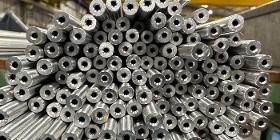
AMETEK SPECIALTY METAL PRODUCTS
United States
Alloy 825 (UNS N08825) is an austenitic nickel-iron-chromium alloy with additions of molybdenum, copper and titanium. It was developed to provide exceptional corrosion resistance in both oxidizing and reducing environments. The alloy is resistant to chloride stress-corrosion cracking and pitting. The addition of titanium stabilizes Alloy 825 against sensitization in the as-welded condition making the alloy resistant to intergranular attack after exposure to temperatures in a range that would sensitize unstabilized stainless steels. The fabrication of Alloy 825 is typical of nickel-base alloys, with material being readily formable and weldable by a variety of techniques Please note that we have a minimum order value of £10,000.
Request for a quote
AMETEK SPECIALTY METAL PRODUCTS
United States
Alloy 800, 800H, and 800HT are nickel-iron-chromium alloys with good strength and excellent resistance to oxidation and carburization in high-temperature exposure. These nickel steel alloys are identical except for the higher level of carbon in alloy 800H/HT and the addition of up to 1.20 percent aluminium and titanium in alloy 800HT. Alloy 800 was the first of these alloys and it was slightly modified into Alloy 800H. This modification was to control carbon (.05-.10%) and grain size to optimize stress rupture properties. In heat treatment applications Alloy 800HT has further modifications to the combined titanium and aluminium levels (.85-1.20%) to ensure optimum high temperature properties. Alloy 800H/HT was intended for high temperature structural applications. The nickel content makes the alloys highly resistant to both carborisation and to embrittlement from precipitation of sigma phase. Please note that we have a minimum order value of £10,000.
Request for a quote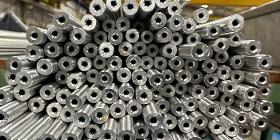
AMETEK SPECIALTY METAL PRODUCTS
United States
Alloy 718 was initially developed for the aerospace industry but its excellent strength and corrosion resistance were recognised by the oil industry and it is now widely used in this field also. Alloy 718 is a nickel-chromium alloy with additions of niobium & molybdenum which can be heat-treated to give high strength, good corrosion resistance, ease of formability and which can be welded with good resistance to strain age cracking. The alloy can be used at temperatures up to 700ºC. Alloy 718 for the oil industry is heat treated such that the hardness does not exceed 40HRC which is the maximum allowed by NACE MR-01-75/ ISO 15156: 3 to prevent stress corrosion cracking. Alloy 718 for aerospace and power generation is heat treated to give maximum strength and high creep resistance with typical hardness values exceeding 42HRC. The major applications are components for gas turbines, aircraft engines Please note that we have a minimum order value of £10,000.
Request for a quote
AMETEK SPECIALTY METAL PRODUCTS
United States
Alloy 690 is a high-chromium nickel alloy having excellent resistance to many corrosive aqueous media and hightemperature atmospheres. The alloy’s high chromium content gives it excellent resistance to caturisation, metal dusting, oxidation and sulfidation at high temperature. In addition to its corrosion resistance, alloy 690 has high strength, good metallurgical stability, and favorable fabrication characteristics. Please note that we have a minimum order value of £10,000.
Request for a quoteDo you sell or make similar products?
Sign up to europages and have your products listed

AMETEK SPECIALTY METAL PRODUCTS
United States
Alloy 276 is a nickel-molybdenum-chromium superalloy with an addition of tungsten designed to have excellent corrosion resistance in a wide range of severe environments. The high chromium, molybdenum and tungsten contents make the alloy especially resistant to pitting and crevice corrosion in reducing environments while chromium conveys resistance to oxidizing media. The low carbon content minimizes carbide precipitation during welding to maintain corrosion resistance in as-welded structures. This nickel alloy is resistant to the formation of grain boundary precipitates in the weld heat-affected zone, thus making it suitable for most chemical process application in an as welded condition. Alloy 276 is widely used in the most severe environments such as mixed acid chemical processing, pollution control, pulp and paper production, industrial and municipal waste treatment, and recovery of sour oil and gas. Please note that we have a minimum order value of £10,000.
Request for a quote
AMETEK SPECIALTY METAL PRODUCTS
United States
Alloy 22, is a versatile austenitic nickel-chromium-molybdenum-tungsten alloy with enhanced resistance to pitting, crevice corrosion and stress corrosion cracking. The high chromium content provides good resistance to oxidizing media while the molybdenum and tungsten content give good resistance to reducing media. This nickel alloy also has excellent resistance to oxidizing aqueous media including wet chlorine and mixtures containing nitric acid or oxidizing acids with chlorine ions. Alloy 22 has resistance to oxidizing acid chlorides, wet chlorine, formic and acetic acids, ferric and cupric chlorides, sea water, brine and many mixed or contaminated chemical solutions, both organic and inorganic. This nickel alloy also offers optimum resistance to environments where reducing and oxidizing conditions are encountered in process streams. This is beneficial in multi-purpose plants where such “upset” conditions occur frequently. Please note that we have a minimum order value of £10,000.
Request for a quote
AMETEK SPECIALTY METAL PRODUCTS
United States
At AMETEK Specialty Metal Products we produce high purity nickel-iron alloy strips, which are primarily used for reed switch systems. These products are widely used in the automotive market for BMS (Battery Management Systems), improved safety in proximity sensors, and cable harness testing. Alloys Our strips are produced using nickel-iron compositions, making sure to use source metals with market leading low levels of trace elements. Alloys include: Nickel-Iron compositions from 36% to 65% Nickel. Sizes Strip thicknesses down to 0.002” (0.0508mm) and wire diameters as small as 0.005” (0.127mm). Applications Finished nickel-iron alloy reed switch systems are used within a multitude of products and devices, mainly being used in the Automotive and Electronics industries. Automotive: BMS (Battery Management Systems), automatic braking assists, door sensors and speedometers.
Request for a quote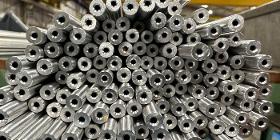
AMETEK SPECIALTY METAL PRODUCTS
United States
Nickel based alloys are very useful materials for the manufacture of high quality tubing products. One of the key reasons is that they offer excellent corrosion resistance in both aqueous and high temperature applications. Nickel alloy tubes offer excellent corrosion resistance, high melting points and resistance to oxidationIn addition to their high melting points and resistance to oxidation and corrosion, nickel alloys are very ductile. Nickel based alloys have a higher ability to accept alloying elements in solid solution than other stainless steel or iron-based alloys. They cantherefore maintain higher metallurgical stability. The combination of high alloying with multiple elements can provide very good corrosion resistance in a wide range of environments while still maintaining good welding and forming characteristics. Please note that we have a minimum order value of £10,000.
Request for a quote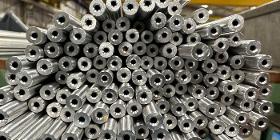
AMETEK SPECIALTY METAL PRODUCTS
United States
Alloy 600 is a nickel-chromium alloy designed for use from cryogenic to elevated temperatures in the range of 2000°F (1093°C). The high nickel content of the alloy enables it to retain considerable resistance under reducing conditions and makes it resistant to corrosion by a number of organic and inorganic compounds. The nickel content gives it excellent resistance to chloride-ion stress-corrosion cracking and also provides excellent resistance to alkaline solutions. Its chromium content gives the alloy resistance to sulphur compounds and various oxidizing environments. In strong oxidizing solutions like hot, concentrated nitric acid Alloy 600 has poor resistance. Alloy 600 is relatively un-attacked by the majority of neutral and alkaline salt solutions and is used in some caustic environments. The alloy resists steam and mixtures of steam, air and carbon dioxide. Please note that we have a minimum order value of £10,000.
Request for a quote
AMETEK SPECIALTY METAL PRODUCTS
United States
Alloy 625 is a nickel-chromium-molybdenum alloy used for its high strength, excellent fabricability and outstanding corrosion resistance. Service temperatures can range from cryogenic to 980°C (1800°F). Alloy 625 strength is derived from the solid solution strengthening effect of molybdenum and niobium on its nickel-chromium matrix. Thus precipitation-hardening treatments are not required. This combination of elements also is responsible for superior resistance to a wide range of corrosive environments of unusual severity as well as to high-temperature effects such as oxidation and carburization. Please note that we have a minimum order value of £10,000.
Request for a quote
AMETEK SPECIALTY METAL PRODUCTS
United States
We manufacture bar and tube products in our corrosion resistant Spinodal alloy, Pfinodal® (C72900), for use in downhole housings, centralizers, and joints that operate in demanding subsea environments. Advantages Our Copper nickel tin Pfinodal® (C72900) bar and tube products present a combination of unique properties that deliver significant advantages for downhole oil and gas applications. Non-sparking and non-magnetic Anti-galling Anti-corrosive Heat treatable to high hardness Safe alternative to Beryllium Copper (BeCu) Pfinodal ® (C72900) Bar and Tube C72900 copper alloy materials are available in bar and tube sizes up to 6” (152.4mm) diameters as well as in both strip and plate products. Our C72900 material is generally provided as machining bar in the aged condition with many sizes available to ship from inventory. We also offer the ability to provide turnkey solutions by providing fully machined parts to OEM drawings.
Request for a quote
AMETEK SPECIALTY METAL PRODUCTS
United States
The chemically stable and high-temperature resistant nickel-chromium-molybdenum alloy 2.4605 (alloy 59) is mainly used in the chemical industry, flue gas desulphurisation plants, paper industry. Alloy 59 is a nickel-chromium-molybdenum alloy with excellent corrosion resistance and high mechanical strength. The alloy has excellent resistance to both oxidizing and reducing media, and possesses superior resistance to chloride pitting and stress corrosion cracking. The alloy is widely used in the most severe environments. Some applications include: flue gas scrubber components, bleach plant and digester components for the pulp and paper industry, sour gas handling equipment, sulfuric acid coolers, waste incinerators and seawater equipment. Please note that we have a minimum order value of £10,000.
Request for a quoteResults for
Copper nickel alloys - Import exportNumber of results
26 ProductsCountries
Company type